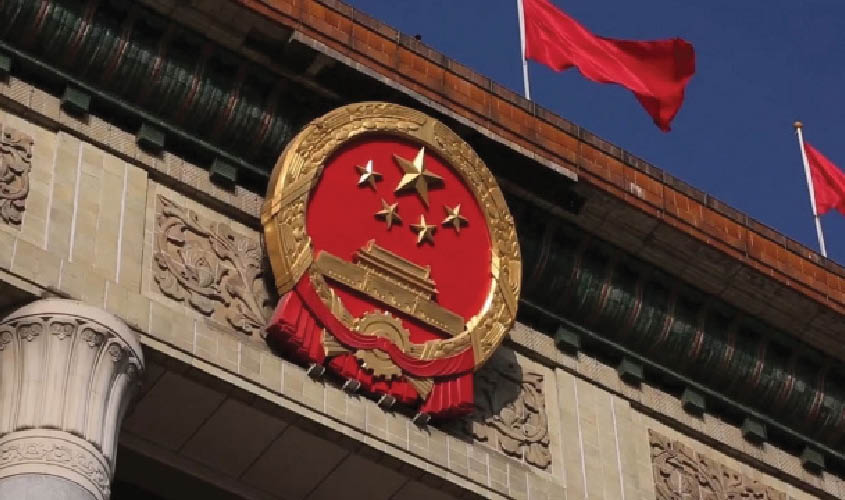Does Doklam still rankle?
China has just concluded plenary meetings of the Party’s top two bodies, which set the agenda for the year ahead. 2,158 delegates of China’s political advisory body, the Chinese People’s Political Consultative Conference (CPPCC) and 2,948 Deputies of China’s version of a parliament, the National People’s Congress (NPC), gathered in the Great Hall of the People in Beijing from 9-11 March, and 5-15 March 2019, respectively. The plenary sessions are intended to formalise approval of the 89 million-strong Chinese Communist Party (CCP) to the policies, programmes and budget of China’s leadership for the coming year.
Highlights of this NPC session included the lowered GDP growth rate of 6%-6.5% for 2019; commitment to provide 11 million new jobs and reduce rural poverty by 10 million; increase the national defence budget by 7.5% to approximately US$177.6 billion and approving a 5% increase in national security expenditure. Unprecedentedly, the Premier’s report admitted that “China faced a complicated and challenging domestic and international environment of a kind rarely seen in many years, and its economy came under new downward pressure”. In an obvious attempt to ease US pressure, his report omitted all reference to the hi-technology “Made in China 2025”. Similarly, mention of the Belt and Road Initiative (BRI) was buried in a single line in a sub-paragraph on domestic connectivity.
The backdrop to the plenary sessions, popularly called “Lianghui”, or “Big Two”, is the spreading dissatisfaction in China with Xi Jinping and his policies. Since the latter half of last year senior Party cadres and reputed Chinese academics have publicly articulated their discontent including against the abolition of age and term-limits for the posts of Chinese President, Vice President and the CCP Politburo. They specifically warned against any return after 30 years to the “one-man” rule of Mao Zedong. Worker discontent rose with strikes in every province of China except the Tibet Autonomous Region (TAR). Protests by veteran and demobilised soldiers added to the CCP leadership’s anxieties. Economists and owners of private enterprises too criticised government policies and failure to reform the State owned Enterprises (SoEs) who, they said, had entered every area of economic activity.
To prevent disruptive incidents and avoid embarrassment to China’s leadership, elevated levels of security were enforced. Beijing, Tianjin and other cities initiated “stability-maintenance” measures and Chinese State Councillor and Minister of Public Security, Zhao Kezhi was in Tianjin from 22 to 23 February to check safety measures. Li Chunsheng, head of the Guangdong Provincial Public Security Department, told public security officials in Guangzhou that there were sensitive anniversaries this year and warned that “hostile forces inside China have long marked this year as an important time to implement their plan—which is a vain attempt—to overthrow our system.”
Enhanced security measures were evident in Tibet because of the 60th anniversary this year of the abortive 1959 uprising against Chinese rule in Tibet and the XIVth Dalai Lama’s flight to India. Tibet was declared off-limits to journalists and foreigners for an extended period till 30 April and TAR leaders inspected Tibetan Buddhist monasteries and convened a series of conferences of security cadres to “uncover” and “eliminate” the “double-faced cadres” owing loyalty to the Dalai Lama. Chinese armed police personnel and armoured police cars staged a show of force through Lhasa on 7 March.
Despite these signs of discontent, the reports presented to the plenary sessions by Chinese Premier Li Keqiang and CPPCC Chairman Wang Yang bore the firm imprimatur of Chinese President Xi Jinping and affirmed his authority. Li Keqiang and Wang Yang opened their reports with acknowledgments to Xi Jinping’s position as the “core of the Party”. Li Keqiang’s report contained 15 references to Xi Jinping and not one to Mao Zedong, Deng Xiaoping or his predecessors. Only Xi Jinping’s political ideology found mention in the reports. Of the 15 and 19 tasks mentioned in the reports to the NPC and CPPCC plenary sessions respectively, the first two listed following “the strong leadership of the Party Central Committee with Xi Jinping at the core” and “Xi Jinping Thought on socialism with Chinese characteristics in the New Era”.
There were some interesting, though mainly tangential, references to the India-China relationship. On the side-lines of the NPC on 8 March, Chinese Foreign Minister Wang Yi claimed Beijing had played a “constructive role” in defusing tensions between India and Pakistan over Pulwama and, referring to the “historic” Wuhan meeting asserted that “the strategic understandings of our leaders trickle down to our people and become a common view”.
Nevertheless, the stand-off at Doklam seems to still rankle the Chinese. Discussing China’s military modernisation with two Chinese military experts on the state-owned CGTN, well known Chinese TV anchor Yang Rui referred to Doklam during his programme on 16 March. Earlier on 15 February, the state-owned PLA Daily reported that 37 NPC Deputies had proposed amendments to China’s Criminal Law to curb military-related rumours online to protect the image of the People’s Liberation Army (PLA). Jiang Yong, one of the Deputies and Political Commissar of the PLA Beijing Garrison Command, specifically cited “China offering soft loans of 20 billion yuan ($2.95 billion) to India in exchange for their retreat” as a “major false rumour”. This rumour, which spread rapidly across China (and was first reported by this author in The Sunday Guardian on 2 September 2017) had caused serious concern to China’s leadership. It was, very unusually, denied then by China’s Ministry of National Defence, China’s Ministry of Foreign Affairs (MFA) and the CCP’s official mouthpiece, People’s Daily.
Jayadeva Ranade is a former Additional Secretary in the Cabinet Secretariat, Government of India and is presently President of the Centre for China Analysis and Strategy.

